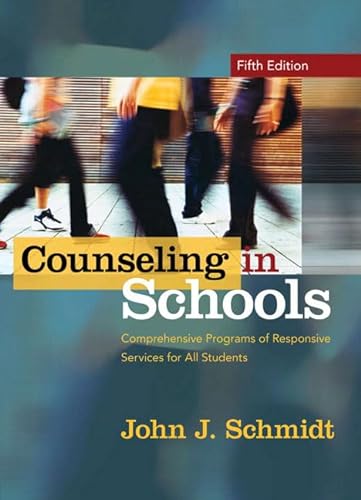The fifth edition of Conseling in Schools retains important historical foundations of the school counseling profession while adapting contemporary definitions and terms to describe comprehensive models for the 21st Century. New information has been added about the ASCA National Model as well as other approaches to comprehensive programs. An entire new chapter about diversity and how increasingly diverse populations will influence school counseling programs and the work of counselors in schools expands this new edition. Diagrams, sample forms, figures, and other illustrations throughout the text clarify points of information, provide practical examples, and offer opportunities for class discussion.
Counseling in Schools:
Comprehensive Programs of Responsive Services for All Students , 5/e
John J. Schmidt , East Carolina University, Emeritus
This popular school counseling text helps students understand the components and services that comprise comprehensive school counseling programs in the context of the twenty-first century.
The fifth edition retains important historical foundations of the school counseling profession while adapting contemporary definitions and terms to describe comprehensive models for the twenty-first century.
New to this edition:
- New information is included in Chapter 4 about particular models of comprehensive school counseling programs, including the ASCA National Model, to illustrate types of comprehensive programs and the attempt to transform the school counseling profession in the twenty-first century.
- A new chapter on Diversity (Chapter 2) applies concepts and issues related to diverse populations to school counseling practice and the preparation of professional school counselors.
- A new Case Study in Chapter 10 illustrates a middle school situation and provides another example of how counselors in schools use various responsive services and team approaches to addressing students’ needs.
Here’s what your colleagues are saying:
“The material speaks to the future trends and concerns surrounding school counseling.”
–Edward A. Wierzalis, The University of North Carolina at Charlotte
“The material is well organized, up-to-date, and accurate. The strengths of this book include the clarity and flow of the writing, relevant and current information, and the headings that guide the reader.”
–Virginia Magnus, The University of Tennessee at Chattanooga
“The writing style is friendly, cogent, and flows well. I was engaged throughout the reading. The text has a wealth of information that is not overwhelming to the graduate students who use this as their guide through a professional school counseling course.”
–David Olguin, The University of New Mexico
![]()
